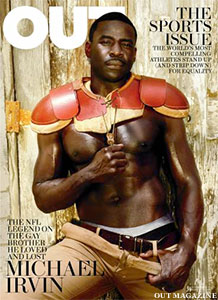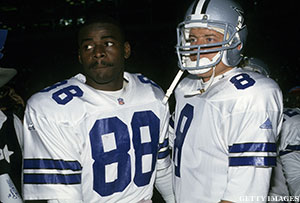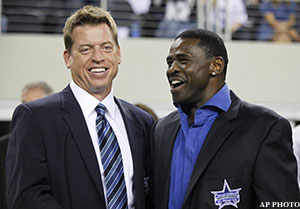
It's easy to read into a gesture. After all, simple innuendo is all that's needed to get an indictment these days. The charge doesn't seem to matter, nor do a person's words. There just needs to be some kind of pose to make people respond.
Like Michael Irvin's pose for the cover of Out Magazine. It's provocative, to say the least. It's also quite timely. Irvin works for the NFL Network and the National Football League needs some positive press right about now. The cash talks are coming to an end -- I'll call it a "lockout" when actual games have been cancelled -- but the damage is done. Both players and owners, through egotistical largesse and squabbles over obscene sums of money, have confirmed a chasm-like disconnect from the real world that the rank and file fan has long tried to ignore.
Now is the time for gestures of the most magnanimous kind.
The Playmaker delivers on a real world issue. I applaud Irvin's words, too. His declaration that he would support a gay teammate is heartfelt, I think. Sure, it comes long after the fact, but such a declaration carries weight for the current generation of athletes. Irvin's words are given additional heft by his own brother's homosexuality.
A person's station is inevitably shaped by the intensity of his exposure.
I've had residence in New York's West Village, San Francisco and now in Asheville, N.C. Each of these places is known for its gay community. But that's one of those shallow descriptors that eclipses the true value of a community. They way I see it, the place that proudly flies the rainbow flag is the place that embraces various points of view. That's the place I want to raise my family.
But that's not the only reason I'm writing today. I really wish to discuss Michael Irvin's pose on the cover of Out Magazine. The tiny shoulder pads sitting atop a bare torso, the pursed lips, and the open trousers are suggestive. Exactly what is suggested lay in the eye of the beholder. A willingness on Irvin's part to be perceived as a member of the gay community? Perhaps. A clear display of Irvin's tolerance? Certainly. Or is it just the photographer's whim? My experience in publishing leads me to believe this last one is just as likely as the first two.
Nonetheless I don't think its necessary for a person of one persuasion to co-opt the sensational mannerism of another persuasion in order to be considered credible or sincere. For instance, I wouldn't expect someone like Tom Cruise to demonstrate his support for the black community by agreeing to be done up in black face for the cover of Ebony magazine. Not every black man has African features and not every gay man is overtly effeminate.

Thus, Cruise could make an equally effective statement by merely standing in place as Tom Cruise and saying something like "Some of my most cherished and lasting friendships are with people of color, so their concerns are my concerns."
But sometimes gestures matter more than words, especially when addressing the jock domain.
Football is for some, for many even, the final frontier of manhood. I've spent a lot of time in the company of non-athletic men so I'm loathe to say athletes are any more intolerant than non-athletes. It does seem that athletes are, in general, more uncouth and less subtle about their feelings. But to suggest that athletes have a monopoly on homophobia is at best, a lazy argument.
Besides, Michael Irvin makes the most salient point of all when dealing with sexuality in professional sports: Business trumps all.
Irvin says when he heard the swirling rumors about Troy Aikman's sexuality, his focus was still on the bottom line. "All I cared about was him being on time with the bang 8," says Irvin. In this context that's a fittingly colorful reference to the skinny post, or "8" route -- the route which was Irvin's bread and butter during his days in Dallas. But he's right. Sometimes it's not about what you can prove, it's about what you know. If you know a guy will always come through at crunch time, this is all the knowledge you need.
Irvin says African Americans should be especially sensitive to the gay rights movement. Where there's shared struggle there should at least be some empathy. Once again he makes a valid point.
But this is where gestures can be confusing. I’m sure that Michael Irvin knows that some people will see the cover and say: "Michael Irvin looks gay." I'm also sure that Michael Irvin knows that while some folks are threatened by homosexuality, there are other folks who are intrinsically threatened by large, black men. As such, both groups need to be made more "approachable" to those who fear them. Humor seems the most popular vehicle to accomplish this. But sometimes, even the best intentions may get lost in translation.
Did you happen to see I Now Pronounce you Chuck and Larry. For those of you who did not (and consider yourselves lucky), the story is about two firemen played by Adam Sandler and Kevin James, who in order to qualify for insurance benefits, must pretend to be a married couple.

When Larry approaches Chuck with the idea of pretending to be gay, Chuck's response, delivered without humor or irony is: "I love you, but I'm not in love with you." I mention this because this particular level of discourse is aimed at the kind of audience that is lost without such base explanation.
That's not the worst part, though. The worst part is Ving Rhames' character. For those who don't know, Ving Rhames is a very large, dark-skinned black man who often portrays characters who are large, dark skinned black men. This role is no different. Except Rhames is seen by his fellow firefighters as somewhat mentally unbalanced and prone to snap at any moment. Thus they keep their distance from him.
But at the film's conclusion, during the "hey let's accept people for who they are moment," it is disclosed that Rhames' character is indeed a gay man who has led a tortured existence because he was never free to be himself.
The Fire chief, played by Dan Aykroyd -- it still amazes me how they got so many quality performers and big names to agree to such garbage -- says with great relief, "thank God he came to grips with his sexuality before he killed someone."
The message -- aimed at the more frightened members of the audience -- is yes, your fears are justified. The big black, scary man may indeed want to kill you. But it's not because of your refusal to accept the fact a big, black man may also be a dignified human being with complex thoughts and emotions. No, that couldn't possibly frustrate him. That rage you perceive is nothing more than his repressed homosexuality. Why, he's really just a big ol' gay teddy bear. Why, there's nothing to fear after all!
Michael Irvin is a big, dark skinned black man. His open jeans and open mind add another layer to his aura. The folks at Out Magazine have scored on a very significant front. They got a very well-known athlete, one who personifies machismo, to deliver a powerful, unobstructed message of tolerance. There's some artistic license involved, but that's not the worst thing, I suppose.
I’ve seen much worse.




